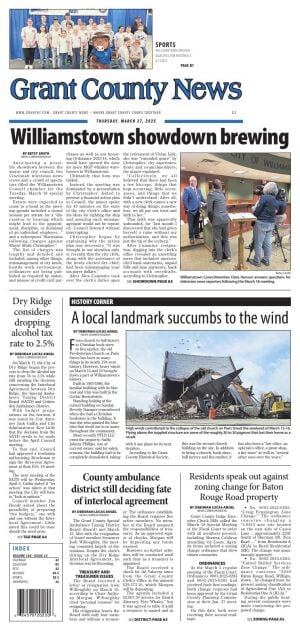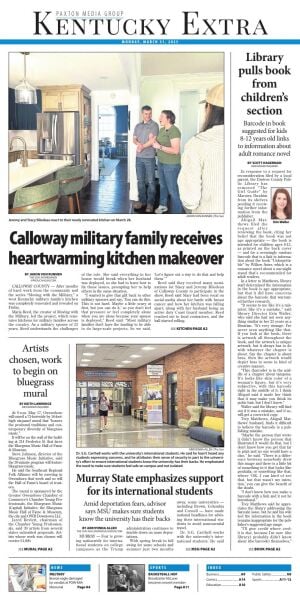Reading is in my blood. As I’ve mentioned in this column before, my mother was a school librarian. But my lineage on this subject runs even deeper. Two of my grandparents served on the local library board, and my uncle was a book dealer. Still, my greatest inspiration for reading may have come from a family member I never even met.
Clem Coomer, my second great-grandfather, was born in rural Adair County in 1877. Like so many of his generation, formal education was a luxury. The demands of the family farm took precedence over school, and as a result, Clem spent much of his life not knowing how to read.
That changed when he met Miss Bertha Hamilton. Bertha was among the first graduates of Lindsey Wilson College and soon taught at a one-room schoolhouse in the community where Clem lived.
Despite their vastly different backgrounds, the two fell in love and soon married. Already in his thirties, Clem learned to read under the patient instruction of his wife.
Naturally, I never knew Clem personally. But he lived to the age of 95, and both my mother and grandmother knew him well. Through their stories, I gathered a sense of who he was—a kind and compassionate man with a remarkable gift for storytelling. Yet what resonated with me most was his devotion to reading the Bible daily. For a man of deep faith who had been denied literacy for so long, the ability to read the Bible for himself was a treasure, not just a skill.
I can’t recall a time when I didn’t know how to read. My parents undoubtedly played a role in teaching me, as did Nannie Bennett, who cared for me as a child. I also credit my preschool friends for assisting—primarily the ones I found on WDCN in Nashville: Sesame Street, The Letter People, and Read All About It! By the age of four, I was reading Bible passages, and by kindergarten, my teacher, Mrs. Gail Miller, would often ask me to read the class stories aloud.
I cannot fathom life without the ability to read. Beyond the joy of literature, literacy is fundamental to learning. Every class I ever took—regardless of subject—demanded reading.
And, in adulthood, I can’t imagine trying to function without understanding how to read books, newspapers, internet sources or manuals. But literacy is not merely about recognizing words; it’s about comprehension, critical thinking, and the ability to build upon knowledge. It is the most essential of all essential skills.
Given its importance, I was pleasantly surprised to learn that the global adult literacy rate now stands at 86.3%. That figure exceeded my expectations. But any optimism I had quickly vanished when I discovered that the United States lags behind at just 86.0%. That’s right—our nation falls below the global average.
A deeper dive into the data only worsened my dismay. The U.S. has the lowest literacy rate among industrialized nations. Every European country surpasses us—our closest peer, Greece, stands at 97.9%. Even within the Americas, we rank below every nation except Belize, Guatemala, and Nicaragua, where access to education remains a significant challenge.
How did we get here? The United States has the highest GDP in the world—nearly double that of China, our closest competitor. Our total national wealth and median per capita income lead the globe. Compulsory education has been the law of the land in all 50 states since 1929, and we spend more per student on public education than almost every other country, exceeded only by Luxembourg, Norway, and Iceland.
For Americans, illiteracy is not a matter of access or resources—it is cultural. And that realization troubles me even more. What does it say about our values? What does it mean for our future? Ray Bradbury once warned, "You don't have to burn books to destroy a culture. Just get people to stop reading them."
I realize I’m preaching to the choir, because you are reading this yourself. But take note of how much time you spend reading versus scrolling through your phone. How often do you read to your children or grandchildren? Do people see you putting value towards literacy? It doesn’t have to be a literary classic. It doesn’t even have to be of high quality. People just need to read more, if no other reason than to practice, and appreciate the skill that so many wish they had.
I have no doubt Clem Coomer would agree.














(0) comments
Welcome to the discussion.
Log In
Keep it Clean. Please avoid obscene, vulgar, lewd, racist or sexually-oriented language.
PLEASE TURN OFF YOUR CAPS LOCK.
Don't Threaten. Threats of harming another person will not be tolerated.
Be Truthful. Don't knowingly lie about anyone or anything.
Be Nice. No racism, sexism or any sort of -ism that is degrading to another person.
Be Proactive. Use the 'Report' link on each comment to let us know of abusive posts.
Share with Us. We'd love to hear eyewitness accounts, the history behind an article.